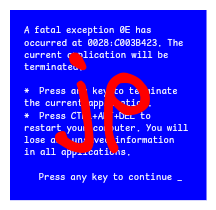- cross-posted to:
- programmerhumor@lemmy.ml
- cross-posted to:
- programmerhumor@lemmy.ml
“Oh, dude, you gotta stop using TJ’s Action Rune of Changed Files. That runebook has a backdoor to one of the hells now. Didn’t you see the patch notes?”
I never update my spell book and nothing bad has ever happened.
Help. Infernal imps somehow got inside my sanctum and used my scrying orb to send rude messages to the rest of the Circle.
You got lucky. Somebody snuck a wyrm into my codex that got all of my thralls mining for coin bits.
This symbol isn’t needed for spells this long, but it’s considered best practice and other wizards will make fun of me for not including it, even though it isn’t needed.
mood
tries to hide C:\jp\scripts\whuj9f.bat and the fact he copied 90% of the thing from a post in the offtopic section of a gaming forum behind his back (with no success)
oh also hhe62m.lsp was copied off a magic spellbook dont ask about it
If you’re adding code you don’t understand to a production system you should be fired
Edit: I assumed it was obvious from context that I’m referring to copy-pasting code from stack overflow or an LLM or whatever without knowing what it does but apparently that needs to be said explicitly.
Never use libraries you don’t contribute to in Production
There’s a huge difference between copy-pasting code you don’t understand and using a library with the assumption that the library does what it says on the tin. At the very least there’s a clear boundary between your code and not-your-code.
I really like to build from zero, but some things are better copied, no matter if you fully understand them or fall short. :)
For example, I’m not qualified to check if Hamilton and Euler were correct - I only do as they explained, and later double-check the output against input.
I didn’t say never copy and paste. I’m saying when you push a commit you should understand what all the LOC in that commit do (not counting vendored dependencies). If you don’t understand how something works, like crypto (not sure what Hamilton or Euler refers to in this context), ideally you would use a library. If you can’t, you should still understand the code sufficiently well to be able to explain how it implements the underlying algorithm. For example if you’re writing a CRC function you should be able to explain how your function implements the CRC operations, even if you don’t have a clue why those operations work.
So you code everything in Assembly from scratch?
Are you seriously trying to equate “I don’t know which instructions this code is using” to “I copied code I don’t understand”? Are you seriously trying to say that someone who doesn’t know how to write
x = a + bin assembly doesn’t understand that code?No, they’re pointing out that it’s a little silly to expect everyone to understand each and every later of abstraction fully before deploying code.
I said you need to understand what the code you wrote (as in, LOC that git blame will blame on you) does. Not that you need to fully understand what the code it calls does. It should be pretty obvious from context that I’m referring to copy-pasting code from stack overflow or an LLM or whatever without knowing what it does.
Many times the code we work on is built in abstractions we don’t know about from top to bottom.
If you are submitting work, you should understand how the code you’re submitting works. Sure, you don’t have to know exactly how the code it calls works, but if you’re submitting code and there’s a block of code and you have no clue how that block works, that’s a problem.
shout out to the trickster mod which is basically “what if magic is a lisp”
How does it compare to hex Casting? I Tried getting into it but it seemed a Bit weird
hex casting is stack-based and has lots of different blocks for doing different things. trickster is fully functional and has very few blocks, but isn’t as well balanced for use with other mods. at least i think that’s the case.
So does that mean trickster is easier to get into?







